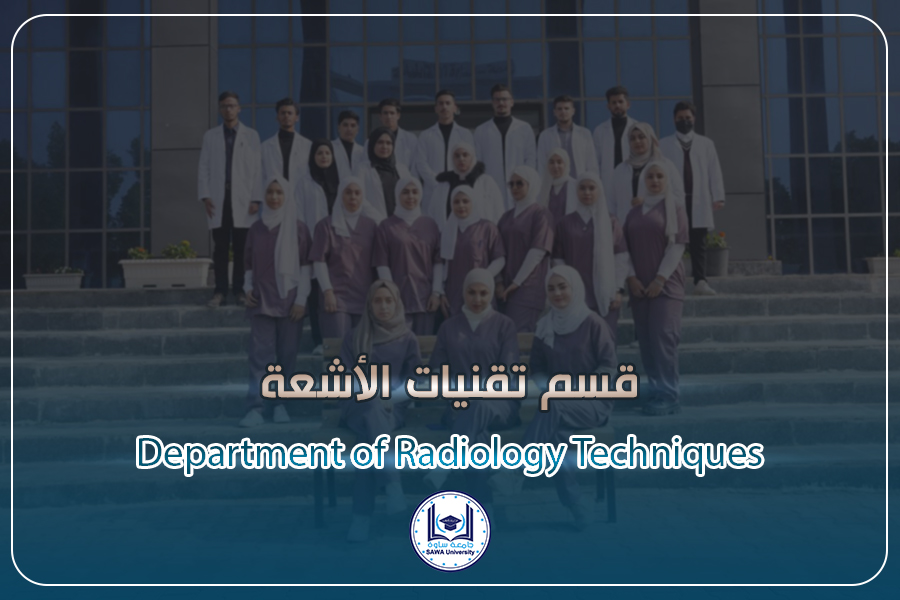Department of Radiology Technologies

Speech of the head of the department
The academic department represents the first administrative unit and the building block of the organizational structure of the university. No university can perform its mission and achieve its goals except through the academic departments. So the Department of Radiology and Sonar Techniques seeks to be an administrative unit with distinctive features and lofty goals through the application of the laws and instructions of the ministry. Its regulations and regulations accurately and honestly, and in a way that reflects positively on the department's outputs of specialized cadres with high skills that contribute effectively to building and advancing Iraqi society in Various medical and health fields.
The Department of Radiology and Sonar at the Faculty of Medical and Health Technologies - Sawa University was established in 2022 and worked to prepare all the requirements for scientific excellence for them by providing specialized cadres of PhD and master's degree holders, which work with dedication and keenness to raise the scientific level of the department's students. In addition to developing the means of university teaching and advanced scientific research by equipping classrooms and educational laboratories with the latest devices and equipment that contribute to the delivery of theoretical and practical scientific information with high accuracy.
The department offers an integrated bachelor's program in radiology technology. The department teaches students and trains them scientifically and practically to acquire the necessary skills to practice work successfully in the field of radiology techniques and their various applications. The educational programs of the department are implemented through courses including anatomy and histology, physiology, pathology, foundations of medicine and medical applications of computers, radiation physics and applied physics in medical technology, modern techniques in diagnostic radiography, ultrasound, magnetic resonance, nuclear medicine, computer tomography, and radiation therapy. Thus, they can make and understand radiological images of various types and work with radiologists, nuclear medicine doctors, and doctors who specialize in examining tumours and other various diseases. The program also qualifies graduates to work as medical technologists in the field of diagnostic radiology techniques in radiology and medical imaging departments in hospitals and health centers.
Vision
To be a pioneer in the field of radiation technology education and medical imaging, and a supporter of the process of development, research and development in Iraq, contributing to building a healthy society.
Mission
Qualifying technical competencies specialized in radiography, qualified to work in health institutions and able to meet the needs of work in various fields of radiology and medical imaging techniques with a focus on professional ethics and achieving safety and quality conditions, and providing research and advisory services to the local community.
Objectives of the Department:
1 - Preparing an advanced health-medical technical staff capable of supplying health institutions and society according to their needs of specialties.
2- Graduating qualified specialists with the knowledge and skills that enable them to deal efficiently with radiology and medical imaging devices and perform radiological examinations of all kinds.
3- Training students on how to deal with various pathological conditions within the radiology department and ways to care for them, and justify radiation exposure to them.
4- Preparing students with professional and administrative ethical foundations and imaging quality in the Department of Radiology.
5- Work to make the safety and security of the patient in the first place during radiography
6- The graduates of the department should be able to provide relevant medical services to all patients, sympathize with them, and respect them without compromising their dignity.
7- Educating students and introducing them to the dangers of radiation exposure and how to protect workers and patients from these risks.
8- Providing the appropriate environment and capabilities necessary to enable faculty members to increase their ability and develop their academic skills to ensure the quality of education outputs.
9- Encouraging faculty members to contribute effectively to scientific research and academic studies.
10- Spreading knowledge and general culture in the field of radiology and medical imaging in the local community through the establishment of exhibitions and public seminars and the use of various media.
11- Benefiting from the academic and professional experiences of faculty members in the service of the university and contributing to solving some of the problems facing the community in their field of specialization.
Description of the graduate and areas of work
Degree awarded by the department:
The department awards graduates a bachelor's degree in radiology and sonar techniques.
Tasks and duties assigned to the graduates of the department:
A. Operation of radiography devices, including acidification devices, ultrasound diagnostic devices (sonar) under the supervision and care of the specialist doctor.
B. Working in radiology centers, arranging information, opening records and keeping related radiographic films, dealing with communicable and infectious patients about radiographic control, and how to prevent these diseases.
C. Work in diagnostic radiology centers in health institutions.
D. Operating various radiography devices (X-rays), digital image projection devices (CR), ultrasound diagnostic devices (sonar), computed tomography (MRA) and magnetic resonance imaging and taking care of them under the supervision of a specialist radiologist.
And the preparation of various radiography devices to work through the preparation of special protocols and according to the examination required by the attending physician, and this is done under the supervision of a specialist radiologist in the radiology department in health institutions.
G. Conducting standard measurements of devices and measuring the percentage of radiation to which patients are exposed and the permissible ratios of patients and workers in the field of work.
H. Preparing patients for various examination with diagnostic devices
